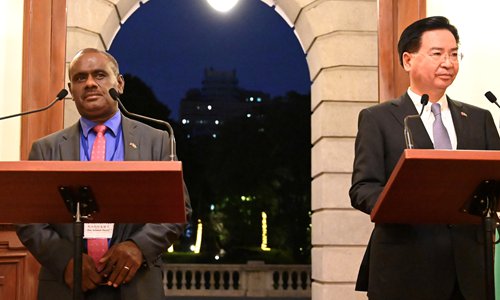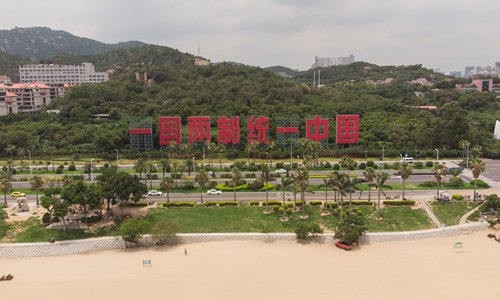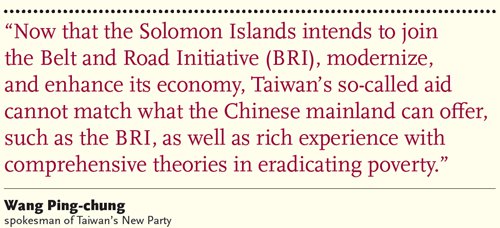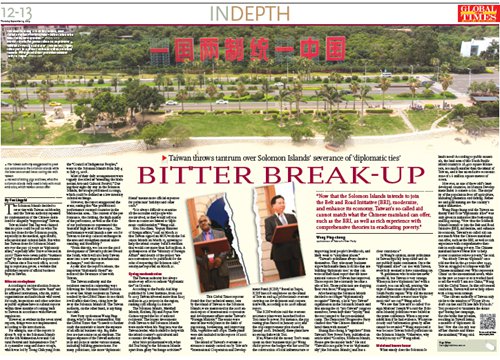HOME >> CHINA
Taiwan throws tantrum over Solomon Islands' severance of 'diplomatic ties'
By Fan Lingzhi Source:Global Times Published: 2019/9/18 11:48:40
○ The Taiwan authority exaggerated its previous assistance to the Solomon Islands while the latter announced it was cutting ties with Taiwan
○ Instead of raising pigs and bees, what the Solomon Islands really needs is help with modernization, which Taiwan cannot offer

The Solomon Islands decided to sever ties with Taiwan on Monday, and the Taiwan authority repeated its condemnation of the Chinese mainland for allegedly "suppressing" Taiwan.
Taiwan leader Tsai Ing-wen claimed that no price could be put on what Taiwan has done for the Solomon people, especially in the medical, agricultural, educational and cultural fields. But what has Taiwan done for Solomon Islanders over the past 36 years as "diplomatic allies," especially after Tsai was elected in 2016? There were seven public "business trips" by the administrative departments of Taiwan since Tsai took office, according to report.nat.gov.tw, a website that publishes reports of official business trips in Taiwan.
Mite on an elephant
According to an introduction from report.nat.gov.tw, the "Executive Yuan" and its affiliated institutions, schools, public organizations and individuals who travel for study, inspections and other activities at public expense have to submit reports within three months of coming back to Taiwan in accordance with relevant regulations.
However, as evident in the seven travel reports, things were not implemented according to the introduction.
For example, one of the reports is about "A trip to the Solomon Islands for the 6th Melanesian Arts and Cultural Festival and Independence Day." A 13-member song and dance troupe, which was led by Tseng Chih-yung from the "Council of Indigenous Peoples," went to the Solomon Islands from July 4 to July 13, 2018.
Most of their daily arrangements were vaguely described as "attending the Melanesian Arts and Cultural Festival." During their eight-day stay in the Solomon Islands, the troupe performed 12 songs, which could be defined as a low-intensity cultural exchange.
However, the report exaggerated the event, stating that "the professional performance stunned countries in the Melanesian area… The content of the performance, the clothing, the high quality of the performers, as well as the scale of our performances represented the 'national' high level of the troupe… The performance would launch a new era for Taiwan to develop cultural exchanges in the area and strengthen mutual understanding and friendship."
"From this trip, we can see the good development of Taiwan's policies toward the South, which will also help Taiwan enter into a new stage in international exchanges," read the report.
A year after the report's release, the important "diplomatic friend" announced the severance of ties with Taiwan.
The Taiwan authority and the residents reacted in contrasting ways following the Solomon Islands decision to sever ties. Many residents in Taiwan reached by the Global Times do not think it will affect their lives, citing how far away the Solomon Islands is. The Taiwan authority, on the other hand, is anything but calm.
New Party spokesman Wang Ping-chung, who is also a commentator, told the Global Times that "It needs to further study the materials to know the expense of an official business trip. But these fees are just a mite on an elephant. The largest expense of the Taiwan authority is its aid projects under various names, including building gymnasiums. For many politicians, one more 'diplomatic friend' means more official expenses for politicians' holidays and other costs."
"It is always difficult to examine all the accounts and people who are involved, as they would tell you these accounts are related to 'diplomatic confidentiality,'" Wang said.
Hsu Szu-chien, "deputy minister of foreign affairs," said on March 21 that Taiwan signed an MOU with the Solomon Islands on March 15, agreeing to help the island country build a stadium that would cost more than $28 million. A spokesperson of the "Ministry of Foreign Affairs" said details of the project "are not convenient to be publicized for the sake of respecting the Solomon side," ettoday.net reported on March 21.

Eyeing modernization
The Taiwan authority has always made every effort to cement "diplomatic ties" in Oceania.
According to the Pacific Aid Map published by Lowy Institute, from 2011 to 2017, Taiwan invested more than $225 million in 452 projects in the region, ranking 13th among 62 donors.
The Solomon Islands, Marshall Islands, Kiribati, Fiji and Papua New Guinea topped the list of national recipients. The largest investments from Taiwan to the Solomon Islands were made when Ma Ying-jeou was the Taiwan leader, which aimed to help with the island country's agricultural and economic development.
After Ma's promotional work, what did Tsai bring to the Solomon Islands apart from glitzy "exchange activities?"
This Global Times reporter found that four technical teams, sent by the island of Taiwan to the Solomon Islands, were mentioned in the 2018 annual report of international cooperation and development affairs under Taiwan's "Foreign Ministry." The teams were sent in line with plans in the fields of pig-raising, beekeeping, and improving fruit, vegetables and crops. These plans were also included in the reports of 2016 and 2017.
The island of Taiwan's overseas assistance is mainly carried out by Taiwan's "International Cooperation and Development Fund (ICDF)." Based in Taipei, ICDF has 108 employees on the island of Taiwan and 142 professionals overseas carrying out development and cooperation work, according to its 2018 annual report.
The ICDF website said the overseas assistance plans were launched before Tsai came to power. For instance, the pig-raising plan started in January 2015 and the crop-improvement plan started in January 2016. Evidently, these plans have no strong links with Tsai.
If so, where did the money Tsai's team spent on their business trips go? Wang said it proves the budget was not used for the construction of local infrastructure or improving local people's livelihoods, and likely went to "unspoken places."
"Taiwan's politicians always deceive themselves. They take many business trips which make them look like they are building 'diplomatic ties,' so they can write in their final report that the international stature of Taiwan has improved. Those reports have instantly become a pile of lies. Those politicians are slapping their own faces," Wang noted.
After hearing the Solomon Islands decided to no longer "diplomatically recognize" Taiwan, a local "pro-Taiwan" organization in the Solomon Islands said that among the 16 "pro-Taiwan" congress members, seven kept their "loyalty," and the rest jumped to the pro-mainland camp. The Democratic Progressive Party claimed that "the Chinese mainland lured them with money."
Huang Kuo-chang, a "legislator" from Taiwan's New Power Party, published an article titled "Goodbye, Solomon Islands; Please give the money back." He said "Taiwan is not guilty over its 'diplomatic ally' [the Solomon Islands,] and has a clear conscience."
In Wang's opinion, many politicians in Taiwan typically keep silent and do not publicly make comments. Once the "diplomatic allies" cut ties with Taiwan, everybody seemed to have something to say. "A gentleman who breaks ties never speaks ill, but Taiwan is very strange. When you have 'diplomatic ties' with a country, you can talk tall, praising 'the trips of democratic diplomacy in the South Pacific region.' Why did the money suddenly become a waste once 'diplomatic ties' are cut?" Wang asked.
"We saw that Taiwan's so-called 'Foreign Minister' Joseph Wu said the (Solomon Islands) politicians were bribed at the press conference. When a reporter asked him if he had evidence, Wu mysteriously said 'information given by allies cannot be revealed.'" Wang suspected it was because Taiwan bribed politicians in the Solomon Islands. "Otherwise, why would you say so?" Wang asked.

Mainland knows better
What exactly does the Solomon Islands need? According to public materials, the land area of this South Pacific island country is 28,400 square kilometers, not much smaller than the island of Taiwan, and it has an exclusive economic zone of 1.6 million square meters of ocean.
However, as one of the world's least developed countries, its Human Development Index is a mere 0.610. The majority of the population lives off agriculture, including plantation and fishing. Fisheries and gold mining are the country's major industries.
Wang Ping-chung said the Taiwan authority's aid to its "diplomatic allies" was only given in industries like beekeeping and hog raising. "Now that the Solomon Islands intends to join the Belt and Road Initiative (BRI), modernize, and enhance its economy, Taiwan's so-called aid cannot match what the Chinese mainland can offer, such as the BRI, as well as rich experience with comprehensive theories in eradicating poverty. The Chinese mainland knows better how to help poorer countries relieve poverty," he said.
"An elderly Taiwan 'diplomat' once told me that in the 40 years after 1949, Taiwan struggled to compete with the Chinese mainland over 'Who represents China' on the international arena, while in the past 20 years or so it worked hard to tell the world 'I am not China,'" Wang told the Global Times. In this self-created confusion, Taiwan will never help others with a long-term strategy.
"The current authority of Taiwan only sticks to the mindset of 'I'll pay if you don't cut ties and I'll lose face if you do.' Tsai promised to 'maintain the status quo' during her campaign, but she broke that promise, resulting in Taiwan losing a number of 'diplomatic allies.' Now she can only tear off her charade and blame the mainland," Wang said.
○ Instead of raising pigs and bees, what the Solomon Islands really needs is help with modernization, which Taiwan cannot offer

In this file photo taken on September 09, 2019, Taiwan's "Foreign Minister" Joseph Wu (right) takes part in a press conference with Solomon Islands' Foreign Minister Jeremiah Manele (left) in Taipei. Photo: AFP
The Solomon Islands decided to sever ties with Taiwan on Monday, and the Taiwan authority repeated its condemnation of the Chinese mainland for allegedly "suppressing" Taiwan.
Taiwan leader Tsai Ing-wen claimed that no price could be put on what Taiwan has done for the Solomon people, especially in the medical, agricultural, educational and cultural fields. But what has Taiwan done for Solomon Islanders over the past 36 years as "diplomatic allies," especially after Tsai was elected in 2016? There were seven public "business trips" by the administrative departments of Taiwan since Tsai took office, according to report.nat.gov.tw, a website that publishes reports of official business trips in Taiwan.
Mite on an elephant
According to an introduction from report.nat.gov.tw, the "Executive Yuan" and its affiliated institutions, schools, public organizations and individuals who travel for study, inspections and other activities at public expense have to submit reports within three months of coming back to Taiwan in accordance with relevant regulations.
However, as evident in the seven travel reports, things were not implemented according to the introduction.
For example, one of the reports is about "A trip to the Solomon Islands for the 6th Melanesian Arts and Cultural Festival and Independence Day." A 13-member song and dance troupe, which was led by Tseng Chih-yung from the "Council of Indigenous Peoples," went to the Solomon Islands from July 4 to July 13, 2018.
Most of their daily arrangements were vaguely described as "attending the Melanesian Arts and Cultural Festival." During their eight-day stay in the Solomon Islands, the troupe performed 12 songs, which could be defined as a low-intensity cultural exchange.
However, the report exaggerated the event, stating that "the professional performance stunned countries in the Melanesian area… The content of the performance, the clothing, the high quality of the performers, as well as the scale of our performances represented the 'national' high level of the troupe… The performance would launch a new era for Taiwan to develop cultural exchanges in the area and strengthen mutual understanding and friendship."
"From this trip, we can see the good development of Taiwan's policies toward the South, which will also help Taiwan enter into a new stage in international exchanges," read the report.
A year after the report's release, the important "diplomatic friend" announced the severance of ties with Taiwan.
The Taiwan authority and the residents reacted in contrasting ways following the Solomon Islands decision to sever ties. Many residents in Taiwan reached by the Global Times do not think it will affect their lives, citing how far away the Solomon Islands is. The Taiwan authority, on the other hand, is anything but calm.
New Party spokesman Wang Ping-chung, who is also a commentator, told the Global Times that "It needs to further study the materials to know the expense of an official business trip. But these fees are just a mite on an elephant. The largest expense of the Taiwan authority is its aid projects under various names, including building gymnasiums. For many politicians, one more 'diplomatic friend' means more official expenses for politicians' holidays and other costs."
"It is always difficult to examine all the accounts and people who are involved, as they would tell you these accounts are related to 'diplomatic confidentiality,'" Wang said.
Hsu Szu-chien, "deputy minister of foreign affairs," said on March 21 that Taiwan signed an MOU with the Solomon Islands on March 15, agreeing to help the island country build a stadium that would cost more than $28 million. A spokesperson of the "Ministry of Foreign Affairs" said details of the project "are not convenient to be publicized for the sake of respecting the Solomon side," ettoday.net reported on March 21.

The boards along a road in Xiamen, East China's Fujian Province read "Unite China with 'one China, two systems.'" Photo: VCG
Eyeing modernization
The Taiwan authority has always made every effort to cement "diplomatic ties" in Oceania.
According to the Pacific Aid Map published by Lowy Institute, from 2011 to 2017, Taiwan invested more than $225 million in 452 projects in the region, ranking 13th among 62 donors.
The Solomon Islands, Marshall Islands, Kiribati, Fiji and Papua New Guinea topped the list of national recipients. The largest investments from Taiwan to the Solomon Islands were made when Ma Ying-jeou was the Taiwan leader, which aimed to help with the island country's agricultural and economic development.
After Ma's promotional work, what did Tsai bring to the Solomon Islands apart from glitzy "exchange activities?"
This Global Times reporter found that four technical teams, sent by the island of Taiwan to the Solomon Islands, were mentioned in the 2018 annual report of international cooperation and development affairs under Taiwan's "Foreign Ministry." The teams were sent in line with plans in the fields of pig-raising, beekeeping, and improving fruit, vegetables and crops. These plans were also included in the reports of 2016 and 2017.
The island of Taiwan's overseas assistance is mainly carried out by Taiwan's "International Cooperation and Development Fund (ICDF)." Based in Taipei, ICDF has 108 employees on the island of Taiwan and 142 professionals overseas carrying out development and cooperation work, according to its 2018 annual report.
The ICDF website said the overseas assistance plans were launched before Tsai came to power. For instance, the pig-raising plan started in January 2015 and the crop-improvement plan started in January 2016. Evidently, these plans have no strong links with Tsai.
If so, where did the money Tsai's team spent on their business trips go? Wang said it proves the budget was not used for the construction of local infrastructure or improving local people's livelihoods, and likely went to "unspoken places."
"Taiwan's politicians always deceive themselves. They take many business trips which make them look like they are building 'diplomatic ties,' so they can write in their final report that the international stature of Taiwan has improved. Those reports have instantly become a pile of lies. Those politicians are slapping their own faces," Wang noted.
After hearing the Solomon Islands decided to no longer "diplomatically recognize" Taiwan, a local "pro-Taiwan" organization in the Solomon Islands said that among the 16 "pro-Taiwan" congress members, seven kept their "loyalty," and the rest jumped to the pro-mainland camp. The Democratic Progressive Party claimed that "the Chinese mainland lured them with money."
Huang Kuo-chang, a "legislator" from Taiwan's New Power Party, published an article titled "Goodbye, Solomon Islands; Please give the money back." He said "Taiwan is not guilty over its 'diplomatic ally' [the Solomon Islands,] and has a clear conscience."
In Wang's opinion, many politicians in Taiwan typically keep silent and do not publicly make comments. Once the "diplomatic allies" cut ties with Taiwan, everybody seemed to have something to say. "A gentleman who breaks ties never speaks ill, but Taiwan is very strange. When you have 'diplomatic ties' with a country, you can talk tall, praising 'the trips of democratic diplomacy in the South Pacific region.' Why did the money suddenly become a waste once 'diplomatic ties' are cut?" Wang asked.
"We saw that Taiwan's so-called 'Foreign Minister' Joseph Wu said the (Solomon Islands) politicians were bribed at the press conference. When a reporter asked him if he had evidence, Wu mysteriously said 'information given by allies cannot be revealed.'" Wang suspected it was because Taiwan bribed politicians in the Solomon Islands. "Otherwise, why would you say so?" Wang asked.

Mainland knows better
What exactly does the Solomon Islands need? According to public materials, the land area of this South Pacific island country is 28,400 square kilometers, not much smaller than the island of Taiwan, and it has an exclusive economic zone of 1.6 million square meters of ocean.
However, as one of the world's least developed countries, its Human Development Index is a mere 0.610. The majority of the population lives off agriculture, including plantation and fishing. Fisheries and gold mining are the country's major industries.
Wang Ping-chung said the Taiwan authority's aid to its "diplomatic allies" was only given in industries like beekeeping and hog raising. "Now that the Solomon Islands intends to join the Belt and Road Initiative (BRI), modernize, and enhance its economy, Taiwan's so-called aid cannot match what the Chinese mainland can offer, such as the BRI, as well as rich experience with comprehensive theories in eradicating poverty. The Chinese mainland knows better how to help poorer countries relieve poverty," he said.
"An elderly Taiwan 'diplomat' once told me that in the 40 years after 1949, Taiwan struggled to compete with the Chinese mainland over 'Who represents China' on the international arena, while in the past 20 years or so it worked hard to tell the world 'I am not China,'" Wang told the Global Times. In this self-created confusion, Taiwan will never help others with a long-term strategy.
"The current authority of Taiwan only sticks to the mindset of 'I'll pay if you don't cut ties and I'll lose face if you do.' Tsai promised to 'maintain the status quo' during her campaign, but she broke that promise, resulting in Taiwan losing a number of 'diplomatic allies.' Now she can only tear off her charade and blame the mainland," Wang said.

Newspaper headline: Bitter breakup
Posted in: IN-DEPTH